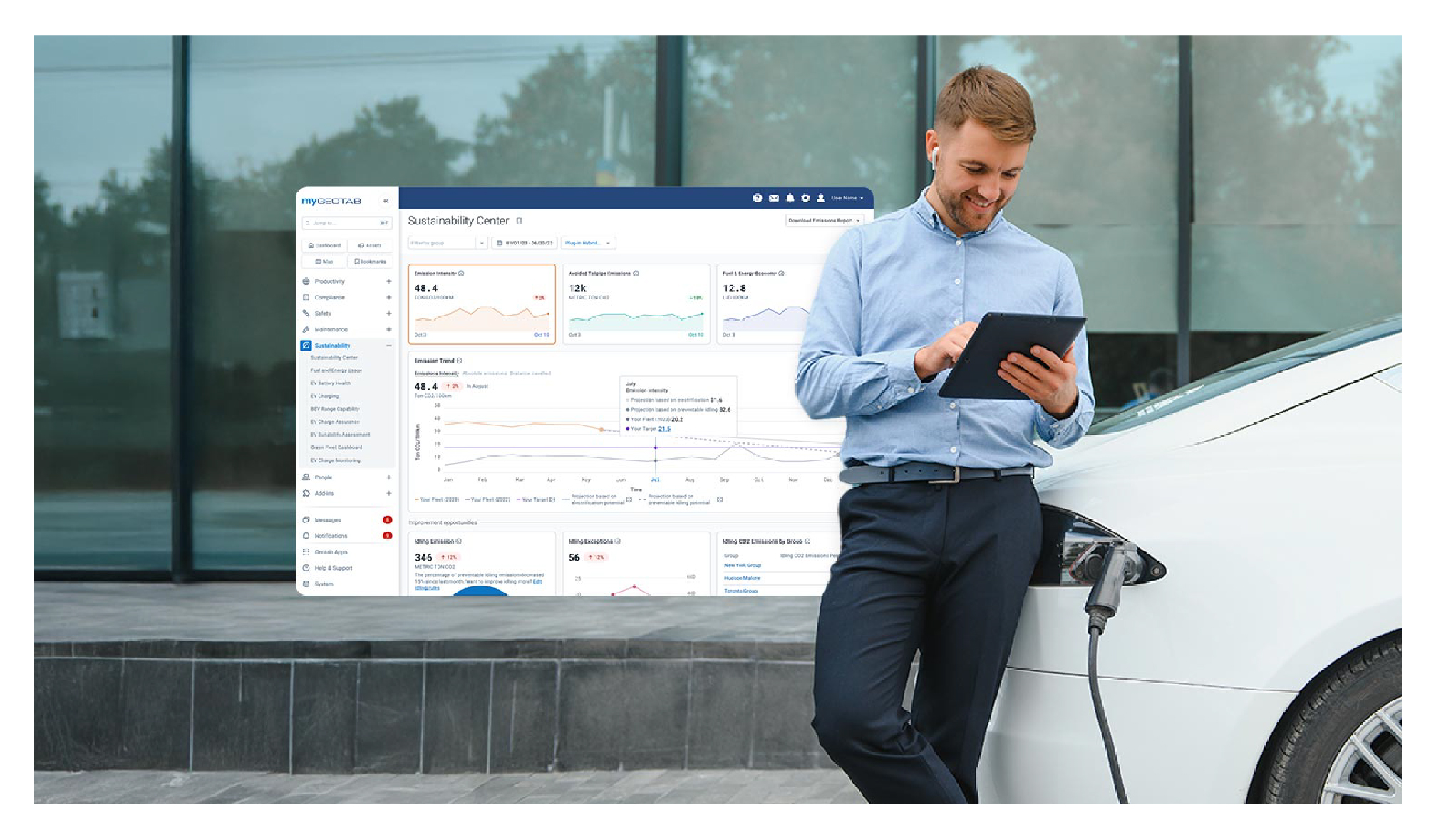Meet emission reduction targets while saving money with the Green Fleet Dashboard
Reduce emissions and fuel costs with this easy-to-use tool from the Geotab Marketplace.


With more organizations setting firm corporate sustainability targets, fleet managers are looking to implement effective strategies to reduce their emissions and costs while improving operational efficiency. To do so, they need tools to assess the fleet’s current impact, identify areas that can be improved and monitor progress towards their goals.
What is the Green Fleet Dashboard?
The Green Fleet Dashboard from Geotab is a vital tool powered by data for fleets to implement effective carbon reduction strategies and improve their operational efficiency.
Available on the Geotab Marketplace, the telematics-based dashboard provides fleet managers with the ability to track progress on their fuel use, environmental footprint and electric vehicle (EV) utilization. Managers can use the data insights to monitor the success of green initiatives – such as anti-idling policies and electrification – in order to compare progress with similar fleets in the Geotab ecosystem.

Understand your fleet’s performance in sustainability
Using the Green Fleet Dashboard, you can find the answers to important sustainability questions like:
- What are my fleet's possible cost and emission savings?
- Is my average fleet fuel economy improving over time?
- How much are my vehicles idling?
- How much does my idling contribute to fuel usage?
- What is the carbon footprint of my internal combustion engine (ICE) vehicles?
- What driving behaviors do my drivers need to work on?
- How do I compare with similar fleets?
- How can I increase my EV utilization?
- How much are my EVs helping lower cost and emissions?
The Green Fleet Dashboard allows you to analyze performance, identify opportunities for improvement and set new goals or targets. For companies looking to electrify, pair the dashboard with an EV Suitability Assessment to identify the best vehicles to replace with EVs.
Download the Green Fleet Dashboard.
Green your fleet by focusing on these four areas
There are four major areas of focus when it comes to greening your fleet, regardless of fleet size. Let’s explore them each in more detail:
1. Fuel efficiency
While the importance of fuel efficiency is well known, it can be difficult to identify what steps need to be taken in order to improve it. To start, you must have a clear understanding of how much fuel you’re using and why — after all, you can’t manage what you don’t measure.
Telematics can help you better understand not only how much fuel your fleet is consuming, but also why. With that information in hand, fleet operators can implement effective measures to help improve fuel efficiency. Examples include monitoring tire inflation and providing real-time driver feedback to curb unwanted behaviors that contribute to inefficiency and dangerous conditions.

Average internal combustion engine vehicle (ICEV) Fuel Economy trend over time compared to benchmark and best-in-class fleets.
2. Idling
Despite what you may have heard, turning off your car or truck and then restarting it does not burn more fuel than leaving it running. Some drivers leave their vehicle idling without even thinking about it, for example, when an employee waits in their car and leaves the engine on, while a coworker goes into a local coffee shop. Fleet idling can be very costly to business operations due to wasted fuel, vehicle maintenance costs and fines, which can be significant in some countries, regions and cities. Learn more about how to stop true idling with this guide.
Targeting this area can help you significantly reduce costs, fuel consumption and emissions. The Green Fleet Dashboard provides insights to monitor these metrics and the potential savings if improvements are made:

3. Driver behavior
Improving driving practices contributes greatly to the efficiency of your fleet. Monitoring common issues like harsh braking and cornering, as well as acceleration and speeding, can help fleet operators understand the areas to focus on for improvement. Setting up notifications to instill new behaviors, like plugging in EVs at the end of a shift, will help maximize uptime in the fleet. In addition, supporting a more environmentally-friendly driving style not only helps fleets become greener, it also boosts efficiency, resulting in cost savings.

See the average number of hard acceleration incidents compared to similar fleets to help determine if further driver coaching is needed.
4. Electrification
Deploying electric vehicles will have a significant impact on fleet emissions. A good place to start is to identify where EVs are best suited for your fleet and where an EV can do the job at an equivalent or lower total cost of ownership.
To get started, the free EV Suitability Assessment analyzes your fleet to provide EV recommendations.
Simplify green fleet management
Paired with the capabilities of the Green Fleet Dashboard, these four key factors can help fleets from any industry take the first steps toward becoming green fleets.
Download the Green Fleet Dashboard.
Learn about more ways to track and improve your fleet sustainability with Geotab.
Subscribe to get industry tips and insights

Charlotte Argue joined Geotab in 2019 and is a thought leader on electric vehicles (EVs), working on accelerating EV uptake since 2009.
Table of Contents
Subscribe to get industry tips and insights
Related posts

Marketplace Spotlight: From Chaos to Clarity, Innovating Fleet Claims with Xtract
April 15, 2025
1 minute read
.jpg)

How to avoid high downtime costs for construction fleets
March 10, 2025
2 minute read

Geotab’s new fleet Sustainability Center simplifies fuel and emissions reduction
March 3, 2025
3 minute read

Geotab Data Connector gets an upgrade for better fleet insights
February 24, 2025
1 minute read
